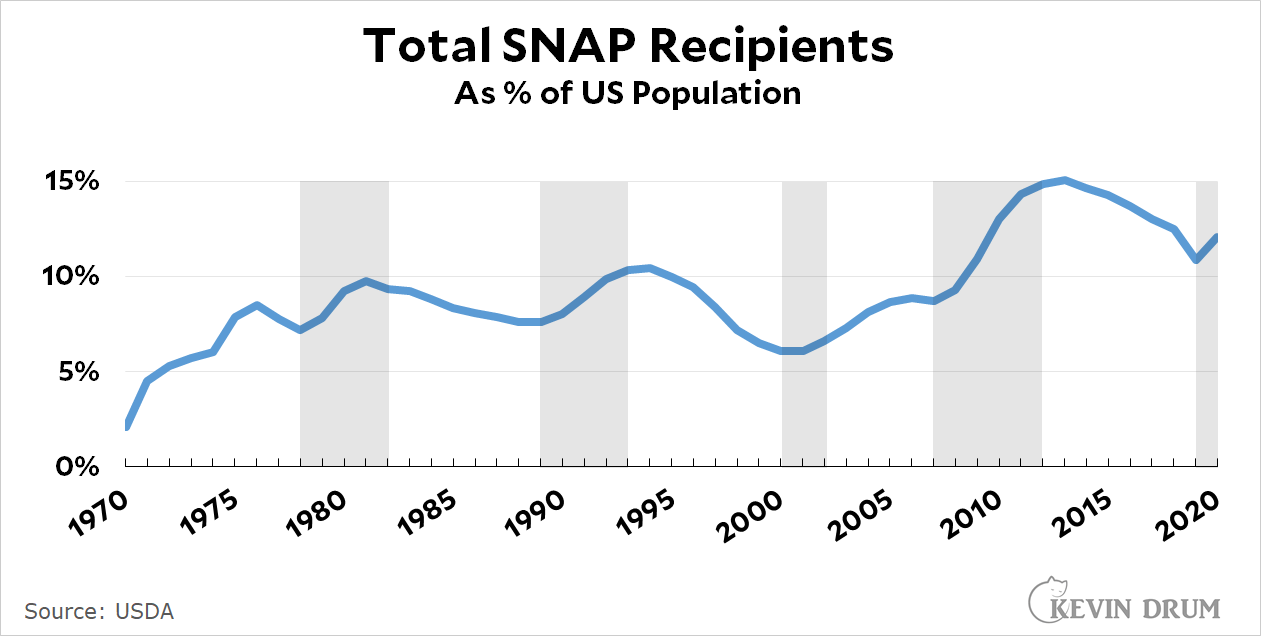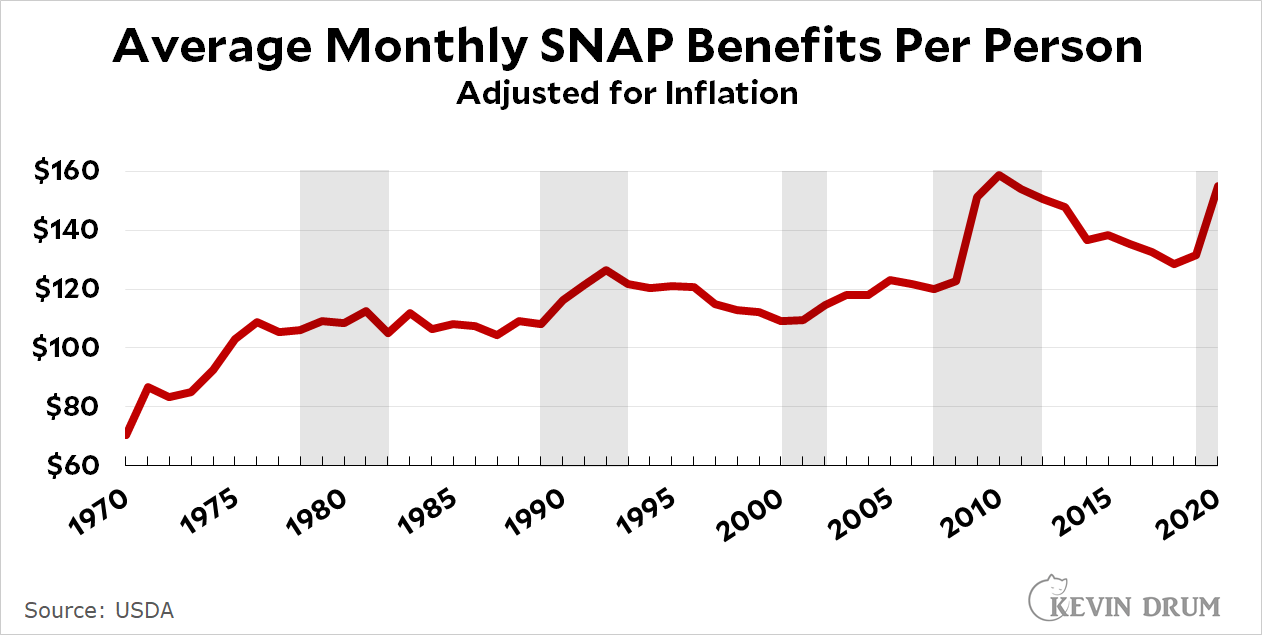The SNAP program, formerly known as food stamps, has been in operation for over 50 years. Within ten years of its start, SNAP benefits were reaching 20 million people, representing about 10% of the population of the US:

Benefits during the early years of the program hovered around $100 per month. That went up at the start of the 1990 recession, again in 2008, and yet again in 2020. Benefits today are about $150 per month:

Despite persistent Republican efforts to cut back on SNAP benefits, it has remained a popular program, generally serving more people during recessions and then declining as the economy recovers.
However, there has also been a long-term upward trend in SNAP benefits. The number of recipients has grown from around 8% of the population in its first couple of decades to 13% or so over the past decade. Likewise, monthly benefits have gone up from around $100 to an average of $140 over the past decade.
All data comes from the USDA Food and Nutrition Program.

Gee. I wonder if the great hollowing out has anything to do with the increase.
Exactly. As incomes haven’t been keeping up with inflation for the vast majority of the population over the last 50 years, more people are finding themselves qualifying for SNAP.
Think if we could drug test more welfare queens, though. Denied claimants would reduce SNAP outlays massively. (But much like Scott Walker when he was County Executive in Milwaukee County, those unused federal Department of Agriculture blockgrant dollars wouldn't be returned to DC but instead be shifted to the grifts of the GQP's asshole friends like Tim Russell, who, after being Walker's fixer in the Marquette University student government election in 1989, turned around fifteen years later & screwed over an Iraq War Veterans Charity with Scott's blessing.)
Click here
https://madison.com/wsj/news/local/crime_and_courts/former-walker-aide-tim-russell-gets-prison-for-stealing-from-veterans-group/article_fbe19ae6-64b7-11e2-a1ae-0019bb2963f4.html
to see Russell doing the perp walk, and to learn more about Walker’s large circle of crooked associates.
Yup.
It's a shame El Jefe didn't pick Walker for VP. He could have been the new Spiro Agnew.
Seems like each recession has additive drastic destructive effects on America.
New NBER paper shows that work requirements for SNAP reduces the number of people on the program by 53% within 18 months but have essentially no effect employment. So, these policies are pretty good at just kicking people off the program but completely worthless at providing incentives for people to go out and find work.
https://nber.org/papers/w28877
If you're so hungry as to need food assistance, what impact does that really have on your ability to work?
Can't work when you're hungry, and you're going to want more than not starving.
My wife and I spend about$450 a month for groceries. Estimates of average cost per couple run from$300 to $625. Obviously SNAP doesn't cover much. A big part of the increase in SNAP use, I think, comes from the switch to EBT cards and the resulting convenience and anonymity. That switch wasn't completed until 2003. And the change was made, not to help the poor, but to keep them from selling Food Stamps for cash.
EBT cards still get sold.
Yes.
What I see people doing here is buying huge amounts of soft drinks with their cards, presumably to exchange for cash with less than honest eateries and the like, probably at a discount to make it worthwhile for the buyer.
You can buy soda much, much cheaper en masse than singles. 25-50¢ a can at say Costco and then $1-2 at a convenience stand.
Damn those bad poor people! I'll bet they're all profiteering from their food stamps!
Given the benefit amount has doubled after inflation was SNAP simply miserly circa 1970 or has the cost of food grown at twice the overall rate of inflation since then?
Snap benefits have not kept up with inflation.
Food and beverages priced at $20 in 1967 → $154.85 in 2021
https://www.in2013dollars.com/Food-and-beverages/price-inflation
This is difficult to credit. The overall trend with food over long time spans (evening out the considerable fluctuations in the stuff) is that it's getting cheaper relative to other items in a budget-- thus spending on food occupies a smaller fraction of personal spending. This has even been posited as one reason for the run-up in obesity.
See: https://www.npr.org/sections/thesalt/2015/03/02/389578089/your-grandparents-spent-more-of-their-money-on-food-than-you-do
While specific food items have gone up, the basic mass-market commodity ingredients have gone down. So yes, but it's complicated.
The increase in recipients should shame citizens of the world’s wealthiest major nation. Increases in inequality are the inevitable result of the crippling of labor power, and the consolidation of power in corporations and the oligarchy. I support living-wage laws as a means to a fairer distribution of economic gains.